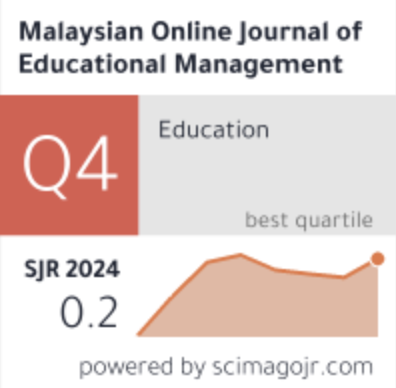DIMENSIONS OF SCHOOL EFFECTIVENESS IN THE SECONDARY SCHOOLS OF PAKISTAN
DOI:
https://doi.org/10.22452/mojem.vol5no3.4Abstract
This research study was aimed at finding the validity and reliability of a tool with 62 items assessing school effectiveness in Pakistan. Different education policies and research studies in Pakistani context have mentioned that there is lack of school effectiveness dimension in the context. This deficiency of the school effectiveness dimensions, caused ineffectiveness of secondary schools in Pakistan. The National Education Policy of 2009 of Pakistan has stated that the National Education Information Management System (NEMIS) is struggling to confirm the dimensions of school effectiveness, but mostly the dimensions are borrowed from UNESCO. Therefore, this study forwards the attempt at developing school effectiveness dimensions in Pakistan. For this purpose, the data were collected from 367 teachers of 103 schools at secondary level in Mardan district (Khyber Pukhtunkhwa). The sample teachers were male and female from urban and rural secondary schools of Mardan district. The tool was developed with three variables such as school effectiveness, school culture, and principal instructional leadership. These variables were discussed in the light of different theories, aimed at providing theoretical background. First, two experts in the field were chosen to vet the tool with 79 items to confirm face validity of the tool. They suggested changes which were followed strictly to finalize the tool. Based on the analysis for Cronbach alpha values after pilot study, the final tool with 62items, 13 dimensions, and three variables was confirmed to assess school effectiveness in Pakistan. Thus the assessment made in this study has confirmed the suitability of the stated tool to find the levels of secondary school effectiveness.









